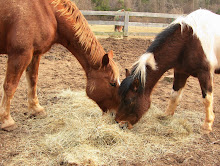Today's training tip begins with Ground Work. It is vitally important, and yet sadly it is also very overlooked. The busy rider just doesn't have the time to spend with their horse, especially if they board, doing anything but riding. I hope after reading this, you will feel differently about that, even if that means instead of going riding one day, you do some ground work instead.
This training tip also applies to those who say, "But my horse is well behaved, he doesn't need training on the ground." I have three things to say to that remark. 1. You are lucky that nothing has fallen apart yet, but don't be surprised if it does. 2. Ground work is not just about the training of the horse. It is training for you too. Realize that we are always teaching our horse, every time we are around him. 3. Doing the kind of ground work I'm going to discuss can not only be considered training, but it WILL enhance your relationship, increase the horse's respect for you, and make you all around better partners.
If you are not familiar with how to use our body language with the horse, please read this article now which touches on the basics. However, there are even more very subtle signals that we are
sending our equine friends.
Horses being prey animals view life in a way that helps ensure their very lives. A predator attacking will typically go for the neck/head. This is why looking directly at the horse, with our two eyes in front, is threatening. Take this a step further, and notice how you stand. Your center is your belly. If your center is directed toward his head, he will likely toss his head up in response to your 'rudeness.' You can bend or turn slightly and his reaction will be more relaxed.
I find that when there seems to be a behavior problem with the horse, it can usually be traced back to the way he is handled. And many times it is something so subtle, the owner has no idea what is going on. The horse is actually REacting to signals you sent. He is not misbehaving, he is acting like a horse. He is reading you like he reads his herd. He has no other way. We, however, do. We can learn the best way to 'talk' to them, since they can not learn our verbal language, nor do they have the ability to think or act like a predator.
Think about what you've just read the next time you greet your horse. If you go right up to him, look at him and kiss, or hug him, don't be surprised if that head goes flying up. (By the way, horses don't really 'get' kissing and hugging. They'd rather have a good scratch on the withers or have you blow in their nostril.)
I will continue writing about this topic, there is a lot to cover!
If you are in Fairfax County, VA, I am now teaching people how to have a better relationship with their horses using these techniques.
Loretta
The Horse Speaks
skip to main
|
skip to sidebar

Subscribe Now: Feed Icon
About Me
Join the 20/20 Horsemanship email list
Continuing to study horsemanship at home through reading.
Search

Custom Search
Loretta's fav horsemanship books
Natural Horsemanship training and Informational Links
- 2020 Horsemanship
- Alpha Horse
- Equestrian Collections
- Equine Now
- Equine.com several of my herd were found here
- Honza Blaha & his amazing Gaston
- Horse Conscious
- Horse Whisperer
- Natural Horse Supply
- Natural Horse Training
- New Horse
- Red Pen Farrier-Karen Killgore
- The Great Falls Horse Meet Up Group
- Virginia Equestrian
- Whales Direct-great horsey gifts
- Wholistic Horse Info





